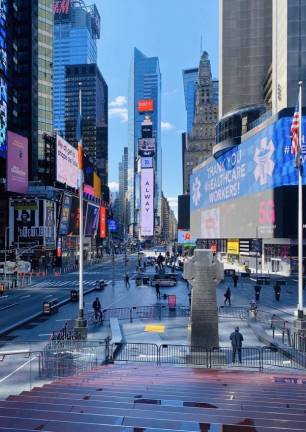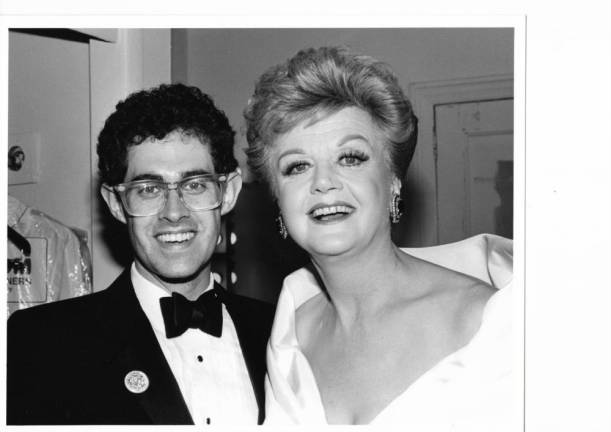Theater Folk Can't Work from Home
Emergency relief agreement to provide show employees with pay and health insurance


COVID-19 is educating us about more than a pandemic. The Broadway brand is not a monolith. Theater workers were independent contractors long before Lyft and Uber drivers were around.
When the Broadway houses shut down, when producers couldn’t hang on until possible Tony nominations, when openings were postponed and the realization hit that some would never happen, the ripple effect shuddered through New York, the nation, and in many cities overseas.
Nonprofit companies and independent Off Broadway shows have also had to recalibrate. The Tony Awards have been postponed and won’t be rescheduled until the theaters open. Producers have been laying off staff in every area of the industry.
There’s some relief promised in the huge stimulus package coming from Congress. Reports are that it extends unemployment benefits for contract workers and freelancers. But theater production relies on the structure of the Broadway season and the contracts carried by live shows, so making plans remains problematic.
Consider those brought on board for any one show, what goes into the two hours or so in the dark that audiences experience. There are the actors and musicians, of course, but there are dozens we don’t think about: lighting and sound technicians, electricians, stagehands, company managers, stage managers, those in the wardrobe department, make-up artists, hair stylists, choreographers, directors, set designers, the advertising folks and press agents and more.
When the Lights Went Out
Speaking for them is the Coalition of Broadway Unions and Guilds (COBUG), which has come to an agreement with The Broadway League of Producers, Theater Owners and General Managers for “an emergency relief agreement [that will] provide Broadway employees with pay and health insurance during the current suspension of all Broadway shows.”
Apparently the agreement covers productions that were running when the lights went out. As for those in the pipeline: The producers of “Hangmen” were the first to pull the plug on the eagerly awaited Martin McDonagh play that was in previews and was due to open March 19th. The Roundabout Theatre Company has postponed its Broadway productions.
COBUG called for government help. The coalition sent over 80,000 letters over two days to Congress, asking that displaced arts and entertainment workers be included in upcoming federal aid packages. Representatives Jerrold Nadler and Carolyn Maloney were among those urging the inclusion of protections for entertainment professionals, previously excluded from relief plans.
In order to qualify for benefits that some of the unions offer, individuals have to document a certain level of income. These folks can’t work remotely, and most of them are freelance. Most are part of the gig economy — they work for a day, a week, maybe a season on a production, and now they are without wages and benefits they counted on, with no end in sight.
Broadway is an economic engine for New York. It is also a national — in fact, a global — phenomenon. There are hundreds of thousands of arts and entertainment families across the country and abroad that are looking at zero income to pay rent, buy food, or pay for medical care during this public health emergency.
At a recent press briefing, New York Governor Andrew Cuomo said no one knows when the pandemic will be contained. Estimates are anywhere from four to nine months or longer. The Broadway League is considering moving the targeted reopening date of April 13 further out, depending on mandated direction from government and health authorities.
"A Roller Coaster"
Coming up to what would be Tony Award time, we won’t be seeing those ads in newspapers or on TV. Longtime theatrical press agent Keith Sherman represented the Tony Awards for 18 years. He’s seen 9/11 with its two day shutdown, a stagehand strike that closed the theaters for nineteen days, and a musicians strike that lasted for 25. “Working in the theater has always been a roller coaster,” he said. “What keeps me grounded is the love of theater, and the knowledge that the only constant is change.”
For audiences, the good news is that refunds are automatic for anyone who bought a ticket with a credit card for performances through April 12. The refund window will probably be extended if the theaters don’t reopen then.
Meanwhile, there is streaming. You can take digital museum trips, watch an opera from The Metropolitan Opera, and see and hear some performances online. But even if a previously taped version of a Broadway show were broadcast, anyone whose seen a live performance knows it ain’t the same. And anyone who has seen a Broadway production knows why millions of visitors come every year, even though they may have seen a version of the play or musical back home.
There’s live and then — no matter how great — there’s everything else. And there’s everything else, and then there’s Broadway.
Leida Snow is a journalist, author and critic.
“What keeps me grounded is the love of theater, and the knowledge that the only constant is change.” Theatrical press agent Keith Sherman